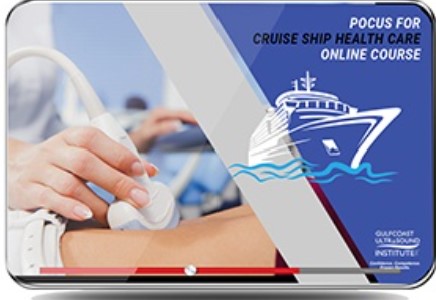POCUS (Point-of-Care Ultrasound) for Cruise Ship Health Care
Planning a cruise ship vacation allows one to experience destinations throughout the world that offers relaxation and adventure based on your desired itinerary. The combination of activities available on board, robust dining options, and exciting on-shore excursions make a cruise ship vacation a very enticing option to consider.
No one plans on becoming sick or injured while on vacation, but unfortunate medical issues do arise. Cruise ships are essentially floating cities offering many amenities, but also a robust medical team to take care of most minor non-emergency health care issues. Occasionally, more serious traumas and health conditions such as fracture or heart attack occur and may require expanded capabilities and/or the possibility of the passenger disembarked to obtain on-shore medical care.
Cruise Ship Health Care Guidelines
Medical facility requirements on board cruise ships are based on a variety of factors including, but not limited to ship size, cruise itinerary, anticipated passenger mix, and number of medical visits.
According to the Cruise Lines International Association (CLIA), “As a result of cooperative efforts between experienced cruise ship physicians and ACEP (American College of Emergency Physicians), CLIA ocean-going cruise lines worldwide carrying 100 or more persons on board, traveling on itineraries to international waters, have agreed to meet or exceed the requirements of the ACEP Health Care Guidelines for Cruise Ship Medical Facilities as revised January 2019. ACEP's guidelines address the facilities, staffing, equipment and procedures for medical infirmaries on cruise ships traveling outside territorial waters of the coastal state. Patients requiring more comprehensive facilities or treatment are typically referred to a shoreside medical facility.”
ACEP POCUS Guidelines for Cruise Ship Medical Facilities
The ACEP Guidelines for Cruise Ship Medical Facilities, adopted in 2019, were updated in 2023 to include the utilization of Point-of Care Ultrasound (POCUS) on-board all CLIA ships, which will become effective January 1, 2026. As of this date, the guidelines stipulate that at least one physician on board must be trained and competent in the core POCUS applications.
POCUS refers to limited ultrasound exams performed at the bedside to answer specific clinical questions that may guide the clinical assessment and treatment decision. The basic core POCUS applications outlined in the guidelines include ultrasound physics, knobology, vascular access, procedural guidance, extended trauma assessment (E-FAST), and evaluation for deep venous thrombosis (DVT).
POCUS Training
Technological advancements have resulted in more affordable, portable/hand-held ultrasound devices that can be utilized as an accurate and important medical imaging tool in the hands of an adequately trained medical provider. Training should include lecture presentations combined with comprehensive, small group hands-on scanning sessions utilizing standardized patient models and inanimate phantoms for needle guidance techniques.
Gulfcoast Ultrasound Institute (GCUS) has developed several training options that are specifically designed for the maritime medical team and the core POCUS applications included in the ACEP Guidelines for Cruise Ship Health Care. Programs can be conducted at the GCUS education facility located in St. Petersburg, Florida, at the cruise ship port, corporate facilities, or on board the cruise ship. Private one-on-one programs can also be coordinated if desired.
Training Options: Traditional Education Format
GCUS offers the option to coordinate a live, traditional format course(s) including live didactic sessions, featuring expert faculty along with hands-on skills training for a custom tailored, comprehensive POCUS course.
Blended-Education Format
The GCUS blended-education format program provides learners access to the didactic modules in an interactive, online course, specific to POCUS for Cruise Ship Medicine which covers the basic ultrasound applications outlined in the ACEP Cruise Ship Health Guidelines, after which, your group(s) participant’s attend a GCUS hands on scanning workshop to practice those particular skills. The blended-education format offers a flexible option for organizations such as Cruise Lines, because learners can complete the online didactic component at their convenience, from anywhere in the world, so long as they have access to a WiFi enabled device. This helps to streamline the timeframe needed to successfully complete a comprehensive hands-on training for busy maritime medical professionals around the world.
Gulfcoast Ultrasound Institute, Inc.
Gulfcoast Ultrasound Institute, Inc. (GCUS) has been the leading education provider in diagnostic ultrasound since 1985, with nearly 40 years and 200,000 medical providers from around the world who have attended our programs and/or utilized our educational resources. In addition, GCUS was one of the first education providers to offer hands-on courses for POCUS Emergency Medicine/Critical Care Ultrasound applications in the United States, beginning in 1994 and expanding to other practice specialties with Point-of-Care application as the technology has evolved.
GCUS is directly accredited with commendation by the ACCME to provide AMA PRA Category 1 Credit(s)™ and many of our courses are also approved for ACEP credit.
Be prepared to integrate POCUS skills into clinical practice for Cruise Ship Health Care and meet the implementation deadline of January 1, 2026. Visit our website or call today for more information.
727-363-4500



